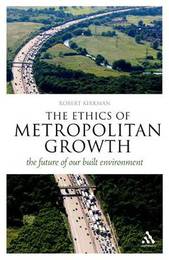
|
The Ethics of Metropolitan Growth: The Future of our Built Environment
Hardback
Main Details
| Title |
The Ethics of Metropolitan Growth: The Future of our Built Environment
|
| Authors and Contributors |
By (author) Professor Robert Kirkman
|
| Series | Think Now |
|---|
| Physical Properties |
| Format:Hardback | | Pages:192 | | Dimensions(mm): Height 198,Width 129 |
|
| Category/Genre | Ethics and moral philosophy
Social and political philosophy |
|---|
| ISBN/Barcode |
9781441113122
|
| Classifications | Dewey:174.93071216 |
|---|
| Audience | |
|---|
|
Publishing Details |
| Publisher |
Continuum Publishing Corporation
|
| Imprint |
Continuum Publishing Corporation
|
| Publication Date |
29 April 2010 |
| Publication Country |
United States
|
Description
The Ethics of Metropolitan Growth is about the decisions people make that shape the built environment, from the everyday concerns of homeowners and commuters to grand gestures of national policy. Decisions about the built environment have taken on a particular urgency in recent months. The financial crisis that began in the home mortgage system, the instability of fuel prices, and long-term projections of oil depletion and climate change are now intertwined with more conventional concerns about metropolitan growth, such as traffic flow and air quality. Now, it would seem, is an excellent time for clear thinking about what the built environment can and should become in the future. Robert Kirkman argues that decisions about how to configure and live within the built environment have ethical dimensions that are sometimes hard to see, questions relating to well-being, justice, and sustainability. This book provides practical guidance for sorting through the ethical implications surrounding metropolitan growth, bringing the most immediate concerns of ordinary people to the centre of environmental ethics.
Author Biography
Robert Kirkman is Associate Professor of Philosophy in the School of Public Policy at the Georgia Institute of Technology, USA. His previous publications include Skeptical Environmentalism: The Limits of Philosophy and Science (Indiana UP, 2002).
|